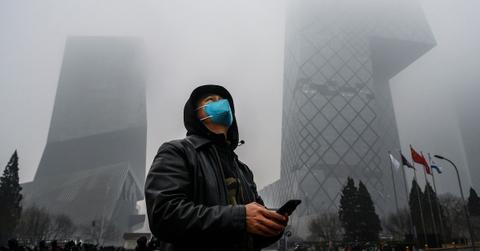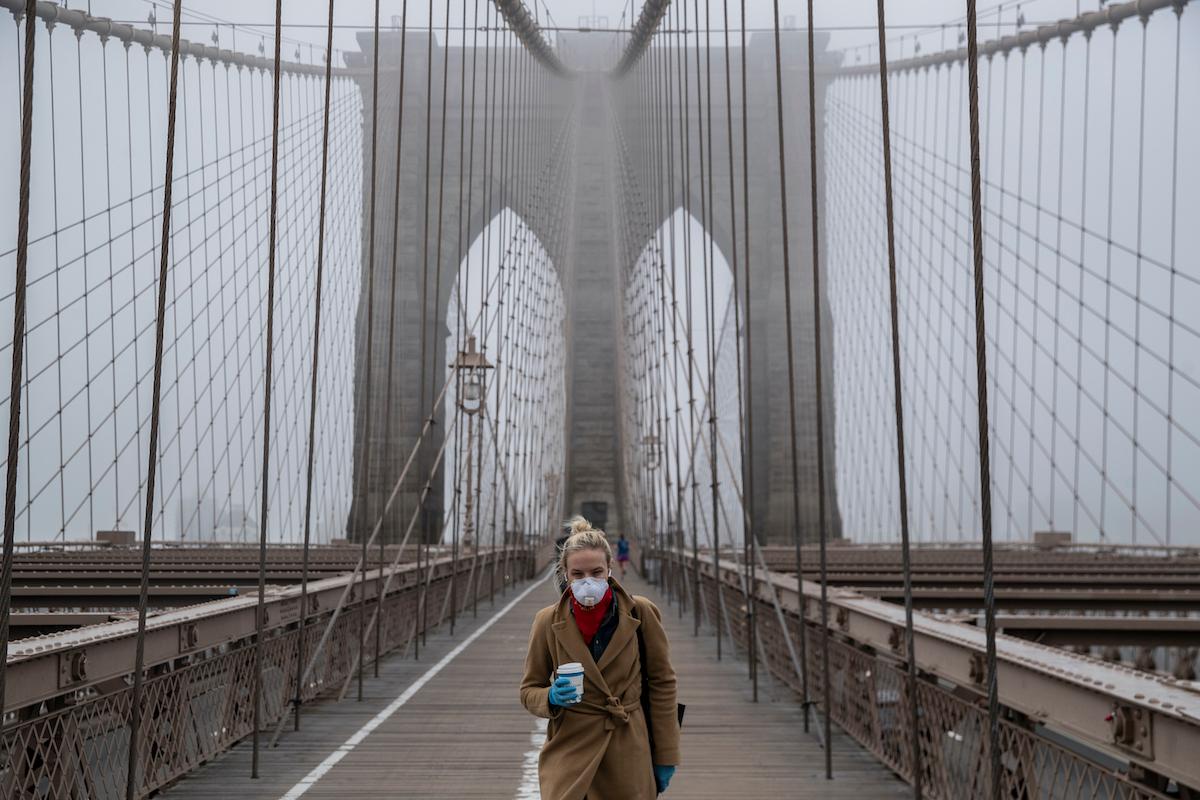A Year After “Nature Is Healing” Memes, the Links Between COVID and Climate Change Are Clearer Than Ever
Published May 6 2021, 1:00 p.m. ET

In the early days of the COVID-19 pandemic, the reported positive side effects of decreased human activity on nature (such as animals returning to their native habitats and air pollution levels declining) helped highlight a connection between the coronavirus and climate change: Humans had the power to start these crises, and they certainly have the power to stop them.
Of course, these news stories quickly regressed into the whole “nature is healing”/“we are the virus” meme, and many dismissed any of the pandemic's so-called positive impacts on pollution and nature as problematic temporary fixes to a problem as sweeping as the climate crisis.

Coronavirus and climate change are linked in many ways.
But in May 2021, more than a year after COVID-19 was declared a pandemic, humans have gained a much deeper understanding of the connection between the coronavirus and the climate emergency. Many hope that governments who responded appropriately to the coronavirus and were successfully able to fend off the virus will inspire stronger governmental responses to the climate crisis as it continues to cause environmental, public health, and justice issues.
These are just a few of the key ways that the pandemic and the climate crisis are connected.
Humans disrespecting animals caused both the coronavirus and the climate crisis.
Many experts have spoken about how humans have similarly caused climate change and COVID-19, and anthropologist Jane Goodall explained that connection in detail at the start of the pandemic.
“I think it’s time we begin realizing [COVID-19 happened] because we have disrespected animals and disrespected the environment,” Goodall told Channel 4 in a video interview in April 2020. “Of course, this ties directly to the climate crisis as well. People tend to forget the climate crisis because of the panic of COVID-19, but it’s our disrespect that’s caused both.”
Epidemiologists believe that COVID-19 originated in an animal who was slaughtered at a live animal market in China, who then passed the virus onto a human, according to the CDC. Not only did the animal agriculture industry reportedly start the pandemic, but the industry is also largely responsible for the climate crisis. Raising animals for their meat, dairy, eggs, skin, and fur produces immense greenhouse gas emissions (which cause global warming), among many other ecologically destructive side effects.
"I also hope that this wakes people up to a better understanding of who animals are, and stop thinking them commodities. They weren't put here for us to exploit and abuse. They were part of a wonderful vibrant world, and we come along and do our best to destroy it,” Goodall added.
COVID-19 and the climate crisis disproportionately affect people of color and people in poverty.
A December 2020 study found that Black and Hispanic populations across the U.S. are disproportionately impacted by the coronavirus, primarily because minority populations tend to have a higher risk of exposure. Early in the pandemic, data showed that in the U.S., people of color — namely, in Black, Latino, and Native American communities — tend to get sick and pass away from COVID-19 at disproportionately higher rates than white people, according to NPR.
Additionally, data published in April 2020 by the NYC Department of Health and Mental Hygiene found that low-income neighborhoods in New York were amongst the most affected by the coronavirus, as per TIME.
The climate crisis follows a similar pattern — there are numerous ways in which climate change disproportionately hurts communities of color and low-income communities. For instance, polluting infrastructure such as landfills, coal plants, toxic waste dumps, factory farms, and slaughterhouses are often built in Black, Brown, and low-income communities, according to the Food Empowerment Project. These facilities (among many other sources) cause air, soil, and water pollution, which lead to various health issues and even death amongst these communities.
The climate crisis is so much more than just an issue for tree huggers to worry about — it is one of climate justice, that everyone who champions social justice should care about.
Rich countries can buy their way out of both climate change and the coronavirus.
As coronavirus vaccines slowly roll out, a “vaccine gap” is becoming more and more apparent between wealthy nations and developing countries. For example, as The New York Times points out, the U.S. has vaccinated more than half its population, while India is struggling with only 9 percent of people vaccinated and rapidly rising COVID-19 rates, as of early May 2021.
The newspaper notes that this vaccine gap makes it clear how desperately developing nations need help from richer nations who have access to vaccines — and how those rich countries should be using their resources to help poorer countries fight the climate crisis, too.
Rich countries are the ones emitting the most greenhouse gases, and their leaders should feel a responsibility to financially help the developing countries that are disproportionately affected by those greenhouse gas emissions. The U.S. is finally sending India emergency medical aid to help with India’s surging coronavirus rates — so why not apply that response to the climate crisis? (The short answer: money).
Both climate change and the coronavirus are killing people at unnatural rates.
Without the COVID crisis and the climate crisis, it’s likely that we would have lost less lives in recent years.
In 2019, CNN conservatively reported that climate change causes an estimated 250,000 human deaths each year; as of May 6, 2021, the coronavirus has killed about 3.3 million people worldwide, as per Worldometer.
Human action has both caused and worsened both of these crises, and by being too stubborn and greedy to shut down the industries responsible (namely animal agriculture and coal) for so much suffering and death, humanity is essentially cutting off its nose to spite its face.
Green recovery would help both crises.
But for all the negative side effects the coronavirus and climate crisis have in common, they have solutions in common, too. Since the early months of the pandemic, experts have stated that green recovery plans from the pandemic will be key, as they could help repair economies, rebuild workforces, and combat climate change.
In May 2020, more than 350 global health organizations wrote a letter to the G20 world leaders asking for them to enact “healthy recovery” stimulus plans from the coronavirus. They also asked the leaders to acknowledge the ways pollution and other environmental issues have worsened COVID-19’s health effects.
“If governments were to make major reforms to current fossil fuel subsidies, shifting the majority towards the production of clean renewable energy, our air would be cleaner and climate emissions massively reduced,” the letter read.
The connections between these two emergencies show how (some) humans do have the ability to act responsibly in the face of a global disaster — and now it’s time to redirect that energy towards fighting the climate crisis.